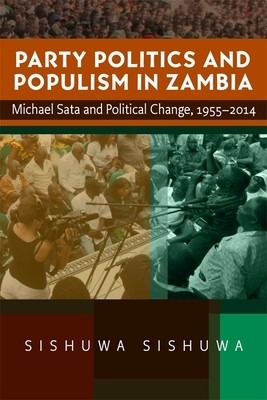
- We will send in 10–14 business days.
- Author: Sishuwa Sishuwa
- Publisher: James Currey
- ISBN-10: 1847013929
- ISBN-13: 9781847013927
- Format: 15.6 x 23.4 x 1.6 cm, kieti viršeliai
- Language: English
- SAVE -10% with code: EXTRA
Reviews
Description
Analysis of Zambian political history through a study of Michael Sata, that shows the importance of individual political leadership in Africa, the nature and competitiveness of electoral politics in single or dominant party regimes and the role of patronage politics.
Donald Trump in the United States, Giorgia Meloni in Italy, Narendra Modi in India, Julius Malema in South Africa - populist leaders are thriving in party politics across the world. Structural changes like the globalisation of the economy, rising inequality, and increased voter detachment from traditional parties have given rise to distinct social grievances on which the populist leader feeds. But how does such a leader emerge? This book uses the study of Michael Sata, former president of Zambia and one of the most intriguing political figures of modern African history, to provide insight into the origins and personality of the populist. It argues that three factors - the structural, the economic and, importantly, the personal - are needed to understand when and how populism develops. Based on exclusive interviews with Sata, as well as with his friends, allies, opponents, and journalists, and on newspapers, archives, personal correspondence, and participant observation, Sata's election to the Zambian presidency in 2011 is explained as the culmination of a political journey spanning the late colonial period (1953-1964), the years of one-party rule (1973-1991), and the era of multiparty democracy (since 1991). The book explores the nature and style of his political strategy, the grievances that he articulated and played on, the constituencies he targeted and mobilised, the policy appeals around which he rallied support, and the language with which he expressed those appeals. At the same time, it uses the prism of Sata's political life to examine the growth of populism in Zambia and its practice in party politics since the 1950s. As well as providing new insights into the long shadow of late colonialism on the country's contemporary politics, this book illustrates the evolution of political ideas and populist strategies.EXTRA 10 % discount with code: EXTRA
The promotion ends in 22d.17:48:26
The discount code is valid when purchasing from 10 €. Discounts do not stack.
- Author: Sishuwa Sishuwa
- Publisher: James Currey
- ISBN-10: 1847013929
- ISBN-13: 9781847013927
- Format: 15.6 x 23.4 x 1.6 cm, kieti viršeliai
- Language: English English
Analysis of Zambian political history through a study of Michael Sata, that shows the importance of individual political leadership in Africa, the nature and competitiveness of electoral politics in single or dominant party regimes and the role of patronage politics.
Donald Trump in the United States, Giorgia Meloni in Italy, Narendra Modi in India, Julius Malema in South Africa - populist leaders are thriving in party politics across the world. Structural changes like the globalisation of the economy, rising inequality, and increased voter detachment from traditional parties have given rise to distinct social grievances on which the populist leader feeds. But how does such a leader emerge? This book uses the study of Michael Sata, former president of Zambia and one of the most intriguing political figures of modern African history, to provide insight into the origins and personality of the populist. It argues that three factors - the structural, the economic and, importantly, the personal - are needed to understand when and how populism develops. Based on exclusive interviews with Sata, as well as with his friends, allies, opponents, and journalists, and on newspapers, archives, personal correspondence, and participant observation, Sata's election to the Zambian presidency in 2011 is explained as the culmination of a political journey spanning the late colonial period (1953-1964), the years of one-party rule (1973-1991), and the era of multiparty democracy (since 1991). The book explores the nature and style of his political strategy, the grievances that he articulated and played on, the constituencies he targeted and mobilised, the policy appeals around which he rallied support, and the language with which he expressed those appeals. At the same time, it uses the prism of Sata's political life to examine the growth of populism in Zambia and its practice in party politics since the 1950s. As well as providing new insights into the long shadow of late colonialism on the country's contemporary politics, this book illustrates the evolution of political ideas and populist strategies.

Reviews